
Naming every expedition participant in a telepresence-enabled mission is next to impossible! Many from dozens of institutions across the country have provided input into the expedition plan and are expected to participate. However, we've assembled information about the members of the science and remotely operated vehicle teams who are physically onboard NOAA Ship Okeanos Explorer, and whose voices you are likely to hear most often when watching the live video. And of course, none of this exploration would be possible without the work of the dedicated NOAA Commissioned Officer Corps and civilians who operate NOAA Ship Okeanos Explorer as part of NOAA's fleet managed by NOAA's Office of Marine and Aviation.
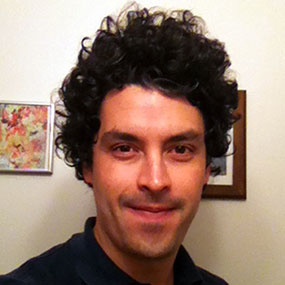
Co-science Lead - Lehigh University
Santiago's research focuses on the ecological and evolutionary processes that produce global biodiversity patterns in the ocean. He uses interdisciplinary approaches that combine molecular and environmental data with bioinformatic tools to study the past, present, and future of deep-sea and cold-water ecosystems, focusing on species of corals, anemones, fish, and crustaceans. He has participated in more than 16 oceanographic expeditions, including several via telepresence.
Santiago received bachelor's degrees in Biology and Microbiology, and a Master's degree in Biological Sciences from the Universidad de los Andes in Bogota, Colombia. During his Master's, he was a graduate fellow at the Smithsonian's National Museum of Natural History. He earned a Ph.D. in Biological Oceanography from the Massachusetts Institute of Technology - Woods Hole Oceanographic Institution (WHOI) joint program. Santiago was also a postdoctoral fellow funded by the Canadian Institutes of Health Research at the University of Toronto. He is currently a Visiting Assistant Professor at Lehigh University and a Guest Researcher at WHOI and Temple University. In addition to his research, he also teaches courses in biodiversity, epigenetics, and oceanography. You can learn more about Santiago’s research and interests at his website: http://santiagoherrera.github.io/ .
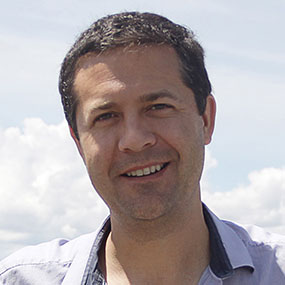
Co-science Lead, Associate Professor - University of California Santa Barbara
Dr. Matt Jackson's research interests focus on the long-term evolution and dynamics of the deep Earth. Volcanoes erupted at oceanic hotspots provide insights into the composition of the Earth's interior: deep-seated mantle plumes convey material from the deepest mantle to the shallow mantle, where they melt. The chemistry of these melts, which are erupted at the Earth's surface, gives clues to the composition of the Earth's interior. The lavas collected from the Samoan hotspot will shed light on evolution of Samoan hotspot volcanoes and, potentially, volcanoes from nearby hotspots that have contributed volcanism to the Samoan region.
Matt has spent several months at sea on prior oceanographic expeditions focusing on submarine volcanoes. All prior cruises focused on dredging to retrieve volcanic rocks, and the Okeanos Explorer cruise will be Matt's first ROV-based expedition.
Matt received his B.S. from Yale University and his PhD from the Massachusetts Institute of Technology - Woods Hole Oceanographic Institution Joint Program.
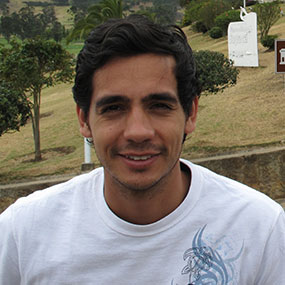
Global Foundation for Ocean Exploration
Fernando graduated from the University of Hawaii at Manoa with a B.S. in Mechanical Engineering. During his studies, he had experience in several fields including conceptual design, aerospace research, mechanical design, robotics and software development. From these activities he was able to intern for NASA at the Jet Propulsion Laboratory, present research in a national conference, and even coauthor a technical paper in the Journal of the Astronautical Sciences. His most recent position was at the Field Robotics Laboratory (FRL) where he helped support operations, testing and software development for two unmanned surface vehicles. From his time in FRL, he discovered a true passion for development and design of robotic systems. Originally from Colombia, Fernando enjoys outdoor activities and currently resides in State College, Pennsylvania.
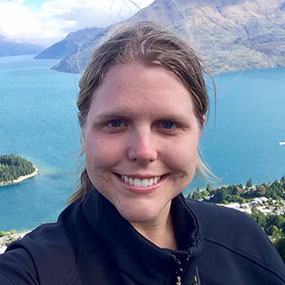
Video Producer - Global Foundation for Ocean Exploration
Caitlin Bailey holds a MFA in Science and Natural History Filmmaking from Montana State University and a B.S. in Animal Biology from Texas A&M University-Corpus Christi. Her background includes fieldwork with sea otters in Alaska, lab research on wild mice vocalizations, and mentoring undergraduate students in biology. In pursuit of her filmmaking career, Caitlin held a writing and film internship at NASA Goddard Space Flight Center and worked as a camera operator and stage manager with Montana PBS. Before her current position on the Okeanos Explorer, she served as a video engineering intern onboard the E/V Nautilus. This is her first expedition onboard the Okeanos Explorer and she is looking forward to being a contributing member of the video-production team at the Global Foundation for Ocean Exploration. Caitlin currently resides in San Antonio, Texas where she enjoys photography, SCUBA diving, and volunteering for TEDx events.
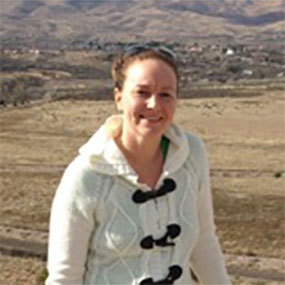
Hydrographer
Amanda Bittinger began her career in hydrography as a NOAA Corps Officer aboard the NOAA Ship Rainier. She has since gained 11 years of experience, working for corporate and private industry offshore and in field offices in the United States, Europe, Central America, and the Central Pacific. She has worked on a wide range of hydrographic surveys purposed for navigation, dredging, wind farms, seismic, pipelines, cable routes, and exploration. Her favorite survey was a cable route on the Adriatic.
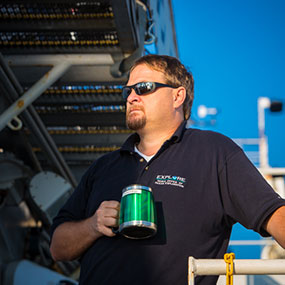
Electronic Systems Engineer - Global Foundation for Ocean Exploration
Roland Brian brings 29 years of experience and a keen eye for precision HD video to the program as a video/satellite and telepresence engineer. Roland began his career in the U.S. Air Force where he worked as a Satellite Communications Engineering Technician with visions of working on the U.S. Space Station. He traded in that quest for one of deep-ocean exploration and sharing beautiful imagery with the world. He has worked with the NOAA Office of Ocean Exploration and Research (OER) and the Okeanos Explorer Program since 2009 and has been engaged in every telepresence-enabled remotely operated vehicle (ROV) expedition. He has also provided services for other projects using OER's mobile telepresence system, including the 2012 Ring of Fire Expedition. His duties aboard NOAA Ship Okeanos Explorer include operation and maintenance of the ship's Telepresence and video systems, including on ROV Deep Discoverer and the Seirios camera platform. Again, Roland's experience embodies the breadth and depth of knowledge the OER program encourages. When not fine-tuning the video and telepresence systems or training and mentoring new team members, he's actively involved in the editing process of our ever-expanding ocean exploration video library. While not at sea, Roland enjoys life with his wife and family in sunny Sarasota, Florida.
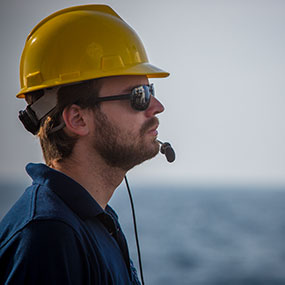
Mechanical Engineer - Global Foundation for Ocean Exploration
Joshua Carlson attended the University of Massachusetts, Dartmouth, where he received a B.S. in Mechanical Engineering with minor in Business Administration. He went on to receive his M.S. in Marine Observation Technology from the University of Massachusetts, Dartmouth School for Marine Science and Technology. Josh has a diverse background, encompassing the use of autonomous underwater vehicles (AUVs) and other types of ocean observation platforms for the purpose of studying ocean turbulence. He has designed and built a deep-ocean camera platform for filming deep-water krill in the Antarctic Ocean and provided mechanical engineering and software capabilities on the Woods Hole Oceanographic AUV Sentry during a recent cruise aboard the NOAA ship Okeanos Explorer. In his current position with NOAA’s Ocean Exploration program, Josh provides engineering, programming, and at-sea support, acting in the capacity of navigator, pilot, and co-pilot for NOAA’s 6000-meter-rated remotely operated vehicle system, Deep Discoverer. His broad range of skills in both engineering and software control development makes him an invaluable member of our team. When not traveling, Josh resides in Fairhaven, Massachusetts.
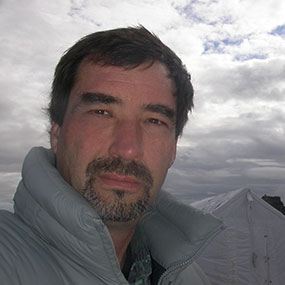
Computer Scientist - Florida Institute for Human and Machine Cognition
Dr. William J. Clancey received a Mathematical Sciences B.A. at Rice University and Computer Science PhD at Stanford University specializing in artificial intelligence. His research relates cognitive and social science in the study of work practices and the design of automated systems. Over a forty-year career he has developed applications for medicine, education, finance, robotics, and spaceflight systems, and is a Fellow of the National Academy of Inventors.
A founding member of the Institute for Research on Learning (1987-1997), he co-developed ethnographic methods for observing, analyzing, and simulating how people interact with each other, computer tools, and facilities in work environments. At NASA Ames Research Center (1998-2013), he served as Chief Scientist, Human-Centered Computing in the Intelligent Systems Division, leading several projects with Johnson Space Center, notably automating file management between Mission Control and the International Space Station, for which his team received the Exceptional Software Award. His study of Mars mission scientists, Working on Mars: Voyages of Scientific Discovery with the Mars Exploration Rovers, received the American Institute of Aeronautics and Astronautics 2014 Gardner-Lasser Aerospace History Literature Award.
At NASA, Bill participated in 17 field science expeditions, including Mars mission simulations during five field seasons on both Devon Island in the Canadian High Arctic and the Mars Society’s Desert Research Station in Utah, where he served as the mission commander. At the Smithsonian’s Carrie Bow Cay Field Station in Belize, his team experimented with a voice-commanded scuba system for surveying coral reefs.
Recently, Bill has collaborated with Okeanos Explorer scientists in Exploration Command Centers at Harbor Branch Oceanographic Institute and the University of Manoa, studying and advising about the telepresence exploration system. During the 2017 American Samoa Expedition, he will be exploring onboard operations, particularly the collaboration among engineers and the lead scientists.
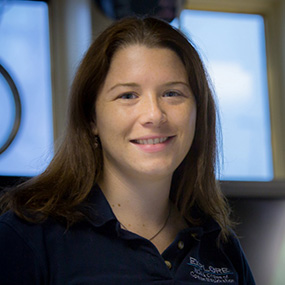
Expedition Manager, NOAA Office of Ocean Exploration and Research
Kelley Elliott is the Senior Expedition Manager for the NOAA Office of Ocean Exploration and Research’s telepresence-enabled exploration program. She holds a Master’s degree in Maritime Archaeology from the University of Southampton and a Bachelor’s degree in Environmental Conservation from New Century College, George Mason University. Kelley is responsible for planning, coordinating, and managing expeditions conducted by NOAA Ship Okeanos Explorer. She has coordinated 10 Okeanos’ cruises since joining the operation in 2009, including five telepresence-enabled remotely operated vehicle cruises and one telepresence-enabled autonomous underwater vehicle cruise. In this role, she acts as a liaison for science and operational partners onshore as well as coordinating the mission planning process between all personnel onboard the ship. Her background demonstrates the depth of knowledge and expertise the Ocean Exploration Program requires and embodies. In addition to geographic information system, video editing, and web publishing expertise, Kelley is an excellent writer and frequently develops and edits articles for publication on NOAA’s website.
Over the last decade, her combined professional and academic field experiences have taken her around the globe investigating a diversity of science topics from Arctic Ocean ecology, tropical ecosystems, and submerged cultural heritage to deep-sea ecosystems including hydrothermal vents, gas seeps, submarine canyons, and deep-sea coral habitats. An explorer at heart, Kelley spends most of her spare time exploring the great outdoors from the volcanos of Nicaragua to the trails surrounding her home.
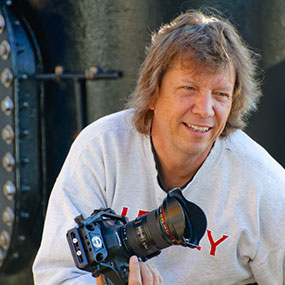
Photographer and Producer - Global Foundation for Ocean Exploration
For 34 years, Emmy-award winning photographer and producer Art Howard has helped viewers experience life through images from 50 countries and seven continents. A native North Carolinian, Art has followed researchers aboard multiple deep-sea missions, documenting the excitement and challenges of offshore reef exploration. Art will use the latest video technology to bring viewers as close as possible to life at sea from the surface to depths of 3,000 feet, capturing both the scientists and the life they seek to understand. Howard has spent the last 11 years independently producing media for the North Carolina Museum of Natural Sciences.
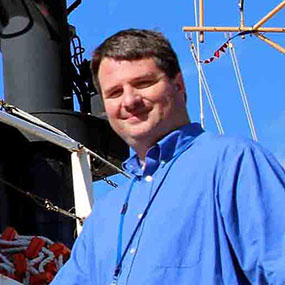
NOAA National Centers for Environmental Information
Jonathan Jackson chose a career that reflects his love of the outdoors, especially fishing. He earned a B.S in Wildlife and Fisheries Sciences from Mississippi State University and a M.S. in Fisheries and Aquaculture from Auburn University. Jonathan was then hired as a biologist with a private consultant in Mobile, Alabama, participating in operations including upland stream surveys and ROV surveys of salt domes surrounding the Deepwater Horizon oil spill. In 2013, his career took him to NOAA Southeast Fisheries Science Center’s Mississippi lab where he worked on a Deepwater Horizon National Resource Damage Assessment (NRDA) ichthyoplankton project and participated in NOAA Fisheries sampling cruises. Jonathan transferred into NOAA National Centers for Environmental Information in 2015. He is the technical manager for the Harmful Algal Blooms Observing System and is participating in efforts to archive NRDA data. During cruises, Jonathan manages the data collected from samples collected by the ROV and works with the science leads to properly handle and preserve the specimens for further scientific analysis.
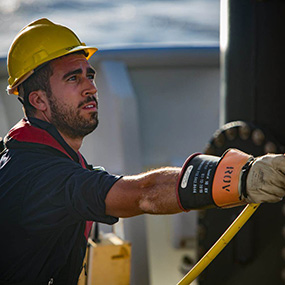
Electrical Engineer - Global Foundation for Ocean Exploration
Sean Kennison holds a B.S. in Mechanical Engineering with a minor in Engineering Mechanics from Pennsylvania State University. He first sailed on the Okeanos Explorer as an intern and member of the Engineering Group, where he performed tasks associated with the launch, operation, and recovery of the ROV system. He has also worked shoreside, designing mechanical parts for the ROVs and assisting with assembly and testing of previously and newly installed equipment. Sean also assisted with installing electronics, testing, data analysis, and troubleshooting on the vehicle. Most recently, he assisted in assembling and modifying a new bio storage box for the Deep Discoverer ROV. While at Penn State, Sean served as team leader on a number of engineering design projects.
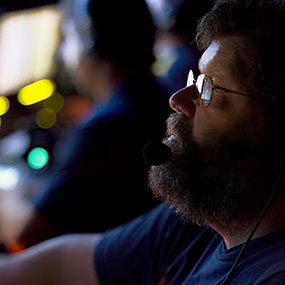
Global Foundation for Ocean Exploration
Bob has almost 50 years’ experience in broadcast engineering. Following a 37-year career with RIPBS, departing in 2006 as Chief Engineer, he worked for the Sea Research Foundation and Ocean Exploration Trust as the Senior Broadcast Engineer. He was responsible for the design, commissioning, and maintenance of the Inner Space Center located at the University of Rhode Island Graduate School of Oceanography. He also worked on many research vessels and supported telepresence operations from NOAA Ship Okeanos Explorer, E/V Nautilus, R/V Endeavor, and R/V Atlantis, plus many other UNOLS ships.
Bob is married and has six adult children, nine grandchildren, and a great-grandson. He and his wife Donna play French horn and are active in many community music ensembles in Rhode Island.
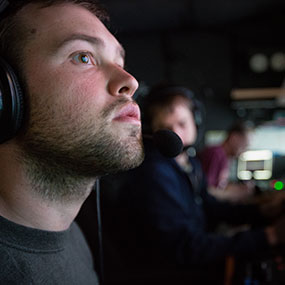
Electrical Engineer - Global Foundation for Ocean Exploration
Jeff Laning holds a B.S. in Electrical Engineering from the University of Vermont. He started his career as an intern with Greensea Systems, Inc., where he worked on design, development, and integration of components and software associated with remotely operated vehicles and autonomous underwater vehicle systems.
Jeff is one of our youngest members and came to our group with a desire to learn new and complex electrical systems. Electrical engineers interested in and capable of working on deep submergence systems are one of the hardest positions to fill. Jeff has done a great job as a key member of the team that built Deep Discoverer and has become a skilled pilot, co-pilot, and navigator. His contribution to ocean exploration is certainly something to be proud of and we hope that other young engineers will be inspired by what he has accomplished. Jeff currently resides in Vermont.
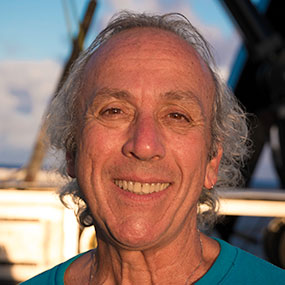
Global Foundation for Ocean Exploration
Don Liberatore has more than 35 years of experience in manned and unmanned submersible operations as a diver-medic, mixed gas lock-out diver and hyperbaric chamber operator and Chief Submersible Pilot for Harbor Branch Oceanographic Institution’s Johnson-Sea-Link I & II research submersibles. He has logged nearly 1,800 dives as a pilot, hundreds more as a pilot-trainer, and over 200 as a mixed gas lock-out diver to 350 feet.
In addition to science missions, he has participated in recovery operations as Submersible Operations Coordinator. These include the search and recovery of the Space Shuttle Challenger, excavation and documentation of the U.S.S. Monitor, documentation of the wreck of the S.S. Edmund Fitzgerald, and the search for the wreckage of Amelia Earhart’s plane in the central Pacific Ocean using two REMUS 6,000 meters autonomous underwater vehicles.
He has worked as crew member and/or project manager for the Kraken (UCONN), Mohawk (UNCW) and Global Explorer (DSSI/Oceaneering Int.) ROVs. He is participating in this expedition as a member of the Deep Discoverer crew.
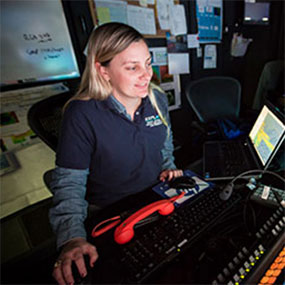
Mapping Lead - NOAA Office of Ocean Exploration and Research
Elizabeth (Meme) Lobecker is a physical scientist with NOAA’s Office of Ocean Exploration and Research. She has led or sailed on over 20 cruises on NOAA Ship Okeanos Explorer. When working on shore, she is located at the Integrated Ocean and Coastal Mapping center at the University of New Hampshire, where she plans Okeanos Explorer mapping operations and cruises, facilitates data archival procedures with the National Geophysical Data Center, and collaborates with other scientists on Okeanos Explorer missions.
Ms. Lobecker began her career in hydrography in 2002 at Science Applications International Corporation, Inc. (SAIC, now Leidos), where she spent five years mapping the U.S. East Coast, the Gulf of Mexico, and Alaska, primarily for NOAA and U.S. Geological Survey contracts. She was also an in-house software tester for SAIC’s multibeam acquisition and processing software suite. In 2007, Ms. Lobecker left SAIC to diversify her survey experience through fieldwork in Papua New Guinea, the North Sea, and the Mediterranean Sea for various research and commercial purposes.
She holds a master’s degree in marine affairs from the University of Rhode Island and a bachelor’s degree in environmental studies, with minors in geography and biology, from The George Washington University.
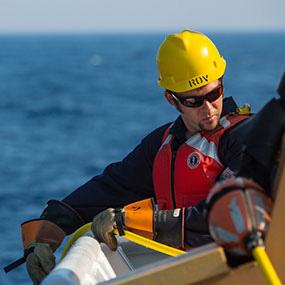
Ocean/Mechanical Engineer - Global Foundation for Ocean Exploration
Karl McLetchie is a graduate of the Massachusetts Institute of Technology. He holds B.S. and M.S. degrees in Ocean and Mechanical Engineering. After graduating, he worked as an engineer on the development of autonomous underwater vehicles and as a naval architect on the design of high-speed aluminum vessels. After a brief, two-year stint of delivering sailboats around the Caribbean, he started his own contracting company, SeaKnowledge, in 2008. Through SeaKnowledge, Karl works on the mechanical design and operation of underwater vehicles. Karl has worked on Okeanos Explorer for six seasons, in all positions on the ROV Team from Winch Operator to Dive Supervisor. When not on assignment for Ocean Exploration, Karl resides in Pemaquid, Maine.
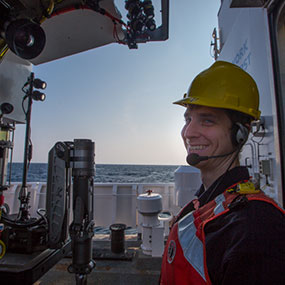
Systems/Robotics Engineer - Global Foundation for Ocean Exploration
Bobby Mohr is a Systems/Robotics Engineer, specializing in autonomous and remotely operated underwater vehicles. He holds a B.S. in physics and graduated cum laude from Davidson College in 2009. Bobby started his career as an engineering technician with Greensea Systems where he was responsible for the design, development, and testing of autonomous underwater vehicle control systems. Like many of our engineers, Bobby realized that he would enjoy the design-build process more if he was able to also pursue the challenges of making vehicles work successfully at sea.
After serving on several projects at Greensea where he specialized in electrical and software systems support, Bobby joined the Ocean Exploration program as an electrical systems engineer. During his time at Greensea and now with NOAA, he has been one of the key electrical engineers on the development of our 6000-meter-rated remotely operated vehicle system, Deep Discoverer and Seirios. Like many of our engineers, he has multiple skills and is a tremendous asset to our program.
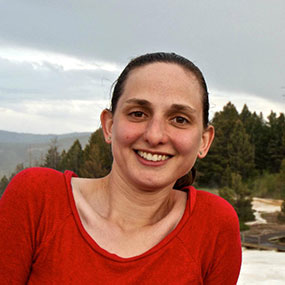
Video Producer - Global Foundation for Ocean Exploration
Emily Narrow is a video producer and editor whose work focuses on science and nature. She earned a Bachelor of Arts degree from Oberlin College where she double-majored in Biology and Cinema Studies. She also holds an MFA degree in Science and Natural History Filmmaking from Montana State University. She was a video producer for a production company in Washington, DC, for three years, where she made public service announcements, ad campaigns, and promotional videos for non-profit and environmental organizations. For the past six years, she has been a freelance video producer, creating videos for clients such as the National Park Service, NOAA, and Montana State University. Most recently, she produced and edited a series of educational videos about camping and hunting for Zero Point Zero Productions. This is her first expedition onboard the Okeanos Explorer with the Global Foundation for Ocean Exploration, and she can't wait to see what amazing discoveries the Okeanos Explorer will reveal. Emily currently resides in Bozeman, Montana.
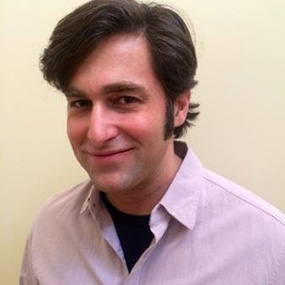
Software/Data and Satellite Engineer - ROV Pilot/Copilot
Andy started his professional career in the U.S. Navy where he ran a small electronic test system calibration laboratory and instructed NATO students in Satellite Ground Station repair. Following the Navy, he obtained a B.A. in History and a M.S. in Computer Science from the University of Vermont before hiring on as the Lead Software Engineer at Greensea Systems. During his tenure at Greensea, Andy designed, developed, and supported over 40 widely varying custom robot control systems and their operator interfaces for government and industry. Notably, Andy was the software lead on our very own Deep Discoverer and Seirios remotely operated vehicles.
Andy reports he so enjoyed working with the NOAA Office of Ocean Exploration and Research team, and their exploration mission, that he asked to join. Andy now splits his time between developing software; managing science and engineering data; maintaining the satellite communications system; and navigating, piloting, and co-piloting the deep-submergence vehicles. During his free time you can often find him in Monkton, Vermont.
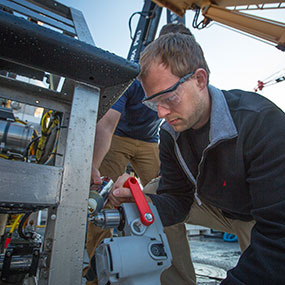
ROV Engineer and Telepresence Team Member - Global Foundation for Ocean Exploration
Daniel Rogers brings with him a diverse background in engineering, media production, and education. Daniel holds a B.S. in physics and received an M.S. in mechanical engineering from the University of Hawaii in 2013. His graduate work focused on the development and evaluation of an autonomous marine vessel designed for port and harbor security missions. Before starting his graduate program, Daniel worked as a science educator at the Bishop Museum in Honolulu where he continued as a digital media producer while in school. A lifelong interest in the sciences inspires him to learn all he can about the natural world and he is passionate about sharing the drama, allure, and wonder of scientific inquiry with others. Daniel currently works as a media producer and autonomous systems engineer in Honolulu, Hawaii.
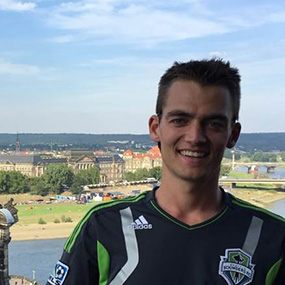
ROV Engineer - Global Foundation for Ocean Exploration
Levi Unema is an Eagle Scout from Lynden, Washington. He holds a B.S. in Electrical Engineering along with a Certificate in Electric Power Engineering from Michigan Technological University. Levi has experience in a number of different industries, ranging from the railroad, to steel mills, to automotive supplier light manufacturing.
Currently living in west Michigan, he enjoys being outdoors and staying active.
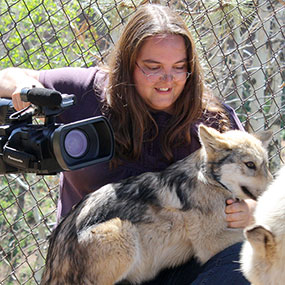
Video Producer - Global Foundation for Ocean Exploration
Annie White is an award-winning documentary filmmaker, photographer, and biologist who specializes in conservation biology and animal behavior. She holds a B.A. in Environmental, Population and Organismic Biology from the University of Colorado and is currently finishing an MFA degree in Science and Natural History Filmmaking at Montana State University.
Her career has taken her from collecting limestone samples and fossils in Wyoming, to studying wild wolf behavior, to filming cougars and grizzly bears. The years she spent living and traveling with captive ambassador wolves kick-started her interest in science education and inspired her to reach out to larger audiences through film.
Her credits include projects for National Geographic WILD, Curiosity Stream, the Yellowstone Wolf Project, and various other non-profit groups. Now the writer and producer for VisionHawk Films, Annie spends her time developing broadcast TV series about wildlife.